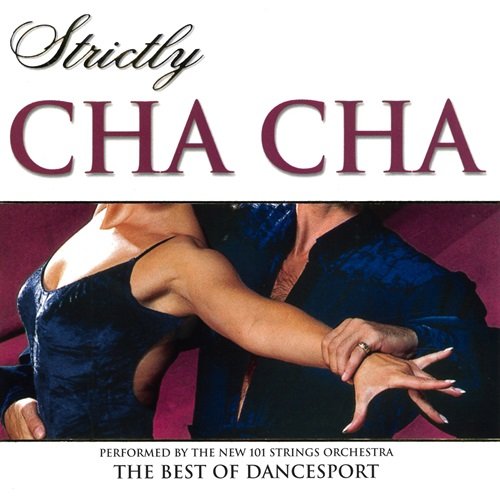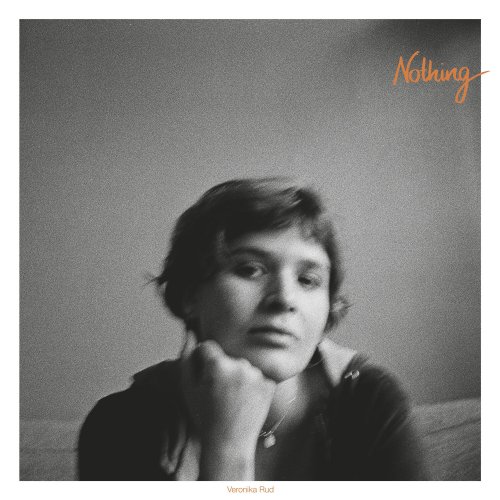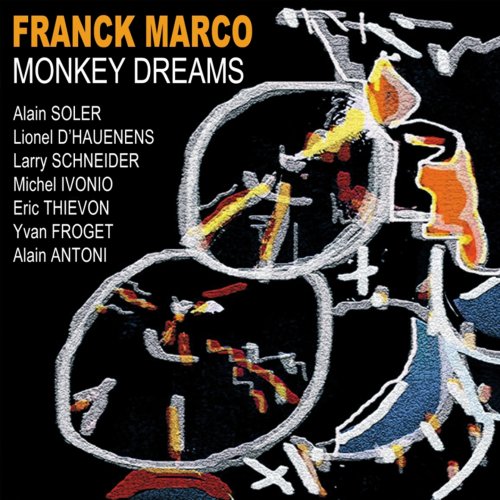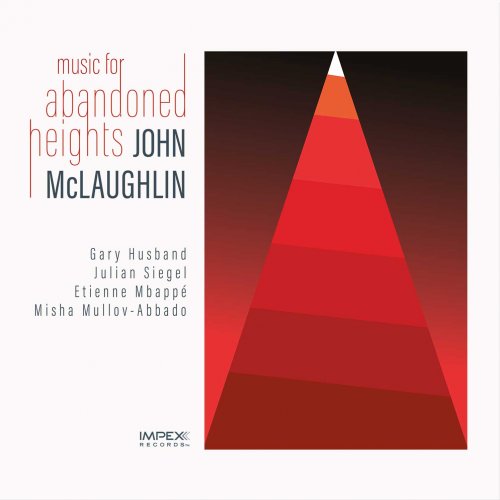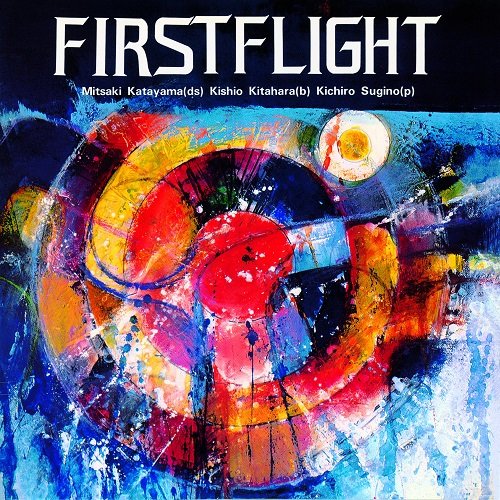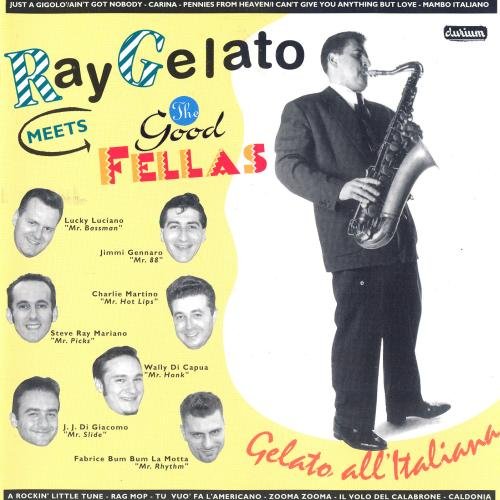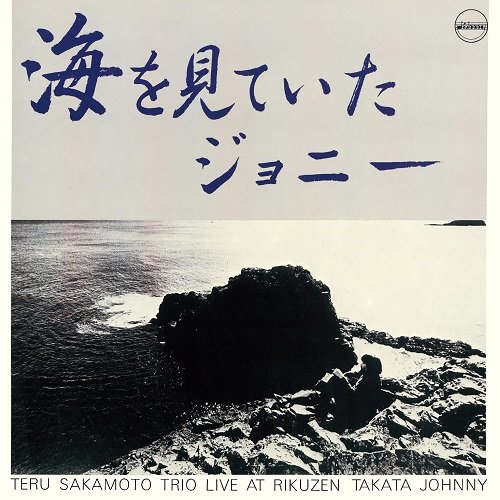The Sixteen, La Grande Ecurie et la Chambre du Roy, Jean-Claude Malgoire - Campra: Tancrede (1992)
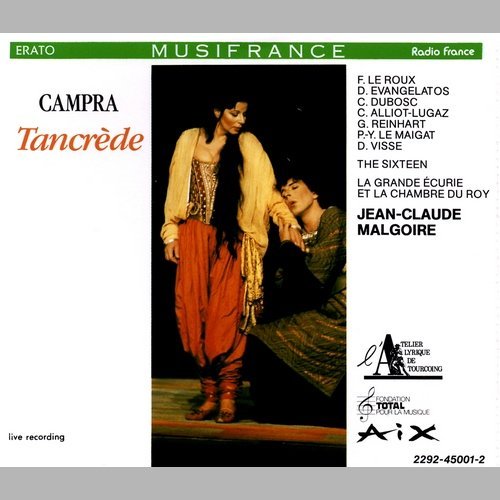
Artist: The Sixteen, La Grande Ecurie et la Chambre du Roy, Jean-Claude Malgoire
Title: Campra: Tancrede
Year Of Release: 1992
Label: Erato / Radio France
Genre: Classical
Quality: FLAC (image+.cue,log,scans)
Total Time: 55:50 + 66:50
Total Size: 601 Mb
WebSite: Album Preview
Tracklist: Title: Campra: Tancrede
Year Of Release: 1992
Label: Erato / Radio France
Genre: Classical
Quality: FLAC (image+.cue,log,scans)
Total Time: 55:50 + 66:50
Total Size: 601 Mb
WebSite: Album Preview
CD 1:
PROLOGUE
01. Ouverture
02. Recit. La Paix, "Plaisirs, Jeux Innocents"
03. Intermede Orchestre (Suivantes De La Paix)
04. Recit. La Paix, "La Discorde A Brise Sa Chaine"
05. Air La Paix, "O Dieux, Qui Prenez Soin"
06. Divertissement Orchestre
07. Choeur Suivantes De La Paix, "Dans Ces Beaux Lieux"
08. Reprise Du Divertissement
09. Reprise Choeur, "Nos Cceurs Soumis"
10. Divertissement Orchestre (Suivantes De La Paix)
11. Air La Paix, "Le Plaisir Vous Appelle"
12. Passepieds 1 & 2
ACTE 1
13. Ouverture
Scene 1
14. Recit. Argant, "Rassemblez Nos Guerriers"
15. Air Argant, "Je Cede A La Fureur"
16. Recit. Herminie & Argant, "Ah! Que Ce Jour M'inspire"
17. Recit. Accompagne Herminie, "L'horreur, L'epouvante"
18. Air Herminie, "En Vain Dans Mon Corps Amoureux"
19. Recit. Argant & Herminie, "On Vient"
20. Intermede Orchestre
Scene 2
21. Recit. Ismenor & Argant, "Je Viens, Par Mon Art Redoutable" 22. Duo Argant & Ismenor, "Nous Pouvons Gouter L'esperance" 23. Recit. Argant & Ismenor, "Je Dois Delivrer La Princesse" Scene 3
24. Air & Choeur Argant & Les Guerriers, "Genereux Defenseurs" Scene 4
25. Recit. Ismenor, "Vous Qui M'obeissez"
26. Choeur Des Magiciens, "Contre Nos Ennemis"
27. Air Ismenor, "Manes Des Rois"
28. Choeur Des Magiciens, "Quel Bruit!"
29. Recit. Ismenor & Argant, "Courons Ou L'honneur Nous Engage"
ACTE 2
Scene 1
30. Air Clorinde, "Suis-Je Clorinde!"
Scene 2
31. Recit. Tancrede, "Princesse, Vos Guerriers"
32. Air Clorinde, "Malgre Votre Victoire"
33. Recit. Tancrede & Clorinde, "Quelle Est Ma Gloire?"
34. Air Tancrede, "Tant De Valeur"
35. Recit Clorinde & Tancrede, "Tout Me Doit Contre Vous"
36. Air Tancrede, "Je Suis Soumis A Votre Empire"
37. Intermede Orchestre (Captifs Sarrazins & Egyptiens)
38. Recit. Clorinde & Tancrede, "Aux Yeux De Vos Captifs”
Scene 3
39. Intermede Orchestre (Captifs & Guerriers)
40. Air Tancrede & Choeur, "Quittez Vos Fers"
41. Ballet Des Guerriers & Des Prisonniers
42. Air Guerrier, "L'Amour Veut Vous Surprendre"
43. Recit. Tancrede & Clorinde, "Je Ne Pretends Point Vous Contraindre"
Scene 4
44. Air Et Recit Tancrede, "Qu'entends-Je!"
Scene 5
45. Recit. Un Guerrier & Tancrede, "Ah! Seigneur!"
CD 2:
ACTE 3
01. Ouverture
Scene 1
02. Recit. Herminie & Argant, "Tancrede Aime Clorinde!"
03. Duo Herminie & Argant, "Ah! Quels Funestes Coups"
04. Recit. Argant & Herminie, "Croyez-Vous Que Pour Lui"
05. Air Argant, "Venez, Jaloux Transports"
06. Recit. Herminie & Argant, "Nous Devons Ici Le Surprendre"
Scene 2
07. Air Herminie, "Cessez, Mes Yeux"
Scene 3
08. Air Tancrede, "Voici De l'Enchanteur La Fatale Retraite"
Scene 4
09. Choeur Bergers & Bergeres, "Chantons Dans Ces Belles Retraites"
10. Air Une Driade, "Ce N'est Point Le Printemps"
11. Intermede Orchestre
12. Air Un Sylvain, "Faible Raison"
13. Menuets 1 & 2
Scene 5
14. Recit. Herminie & Clorinde, "Tancrede Est Par Mes Soins"
15. Air Clorinde, "Il Faut Triompher Avec Gloire"
16. Recit. Herminie & Clorinde, "Si Vous Vouliez Le Secourir"
17. Air Clorinde, "Differe D'un Moment"
18. Recit. Herminie & Clorinde, "Je Vois, Par Vos Regrets"
19. Air Clorinde, "L'objet De Mon Amour" (Chaconne)
20. Recit. Herminie & Clorinde, "Je Ne Veux Plus Dissimuler"
21. Intermede Orchestre (Vol Des Demons)
Scene 6
22. Recit. Clorinde, "Que Vois-Je! Quel Transport L'anime!"
ACTE 4
Scene 1
23. Air Tancrede, "Sombres Forets"
Scene 2
24. Recit. Tancrede, "Ciel! Qu'est-Ce Que Je Vois?"
25. Air Tancrede, "Tout Menace En Ces Lieux"
26. Recit. Herminie & Tancrede, "Cruel, Cesse De Le Pretender”
Scene 3
27. Recit. Ismenor & Tancrede, "Commence A Ressentir L'effet De Ma Puissance"
28. Air Ismenor, "Vengeance Affreuse"
29. Choeur & Ismenor, "Que Le Fer, Que Les Feux"
Scene 4
30. Recit. Ismenor, Herminie & Tancrede, "Rendons-Lui La Raison"
31. Intermede Orchestre (La Haine & La Vengeance)
Scene 5
32. Recit. Tancrede & Clorinde, "C'est Vous Belle Princesse"
33. Air Clorinde, "L'impitoyable Amour"
34. Recit. Tancrede & Clorinde, "Ciel! Quel Aveu Charmant"
35. Air Et Duo Clorinde & Tancrede, "Courons A La Victoire"
36. Recit. Clorinde & Tancrede, "C'est Trop Laisser Voir De Faiblesse"
Scene 6
37. Air Clorinde, "Etes-Vous Satisfaits"
АСТЕ 5
Scene 1
38. Air Herminie, "Quel Bruit! Quels Cris!"
Scene 2
39. Recit. Tancrede & Herminie, "Le Jour A Decouvert"
Scene 3
40. Choeur & Tancrede, "Chantons Les Douceurs De La Gloire" Scene 4
41. Recit. Tancrede & Argant, "Quel Trouble Saisit Mes Esprits"
42. Recit. Accompagne Argant, "Dans La Nuit, Clorinde A Pris Mes Armes"
43. Air Tancrede, "Elle N'est Plus, Mourons"
Performers:
Tancrede - Francois Le Roux
Clorinde - Daphne Evangelatos
Herminie - Catherine Dubosc
Argant - Pierre-Yves Le Maigat
Ismenor - Gregory Reinhart
La Paix / Une Guerriere / Une Dryade - Colette Alliot-Lugaz
Un Sylvain - Dominique Visse
Une Bergere - Alison Wells
Un Guerrier, Un Magicien - Andrew Murgatroyd
Deux Magiciens - Christopher Royall, Jeremy White
The Sixteen
La Grande Ecurie et la Chambre du Roy
Conductor: Jean-Claude Malgoire
André Campra (1660 - 1744): Tancrède. Opera in 5 Acts. Performed by: Francois Le Roux (tenor, Tancrède); Daphné Evangelatos (alto, Clorinde); Catherine Dubosc (soprano, Herminie); Pierre-Yves Le Maigat (barytone, Argant); Gregory Reinhart (bass, Isménor); Colette Alliot-Lugaz (soprano, various minor roles); Dominique Visse (male alto, Un Sylvain); Alison Wells, Andrew Murgatroyd, Christopher Royall, Jeremy White (members of the choir with brief solo appearances); The Sixteen (directed by Harry Christophers); La Grande Écurie et la Chambre du Roy; conductor: Jean-Claude Malgoire. Recorded live at a performance of the Festival of Aix-en-Provence, France, in July 1986. Released by Erato Disques (a division of Warner Classics) in 1990 as 2292-45001-2 (2 CDs). Total playing time: 120'02".
André Campra's "Tancrède" is something of a "missing link", connecting the 17th century stage works of Jean-Baptiste Lully and his frustrated rival Marc-Antoine Charpentier with the late baroque works of Jean-Philippe Rameau. "Tancrède" was given its premiere in 1702 and was repeated again and again on the Paris stage. Even in the 1760's, when Rameau's "Les Boréades" had to be abandoned because of the death of the composer, it was Campra's "Tancrède" that the directors of the Paris Opéra chose to put back on stage because of its popularity.
As an opera, "Tancrède" is, of course, dated. Not only does it not reflect the genius of Monteverdi, whose "Combattimento" will always be remembered as the prime musical version of this story, but it also does reflect a lot of the aspects of French baroque opera which many people today find annoying: personalized gods, emotions and a plethora of nymphs and shepherds are brought on to the stage just for the sake of it, it seems, with "divertissements" being interspersed without any apparent motivation. The tragic story of Tancred and Clorinde is altered radically, and the actual fight between the two happens off-stage and is only reported on in the last act. Additional figures are introduced: Argant, a defeated warrior, who loves Clorinde and wants to be avenged on Tancred; Herminie, an associate of Argant's, who is secretly in love with Tancred; and Isménor, a sorcerer, who uses his magic powers to secure Tancred a prisoner (with some weird scenes of "demons flying through the air and breaking the trees") for Herminie. The 12-track prologue is sung almost exclusively by "La Paix" (reminiscent of Monteverdi's prologues?). The accompanying music is typical of the period in France, with the emphasis on flutes and oboes, and in the last Act there are a number of trumpet fanfares.
Jean-Claude Malgoire and Harry Christophers obviously tried to reproduce the effects that Campra had intended. Their choice of singers reflects very much the feeling that Campra had deliberately written for certain performers with comparatively deep voices. Daphné Evangelatos as Clorinde is a full-throated alto, the male parts are genuinely male throughout (with the exception of Dominique Visse as "un sylvain", the only countertenor in the whole affair) - and Catherine Dubosc as Herminie is a truly beautiful soprano, reflecting the directors' estimation that the original singer of the role had a voice "like a nightingale".
As this is, to my knowledge, the only recording of "Tancrède" that has ever been made, it would be fruitless to try to compare it with other efforts, and criticism of the performance would be unfitting - the whole production should, instead, be praised for its very existence. The singers and the orchestra are, for a live performance, very good, the only drop of gall being perhaps the engineering, which captures a lot of stage noise (trampling of feet, etc) and the clapping of the audience, but leaves the singers and orchestra imposed on one another in the centre of proceedings. The enunciation of the singers is very good, and it was very easy to follow them in the libretto provided, although some slight changes seem to have been made "on the night".
Generally, I would say that anyone interested in French baroque music or in the history of opera before Gluck should have no qualms in buying this. It enables one, at a temporal and geographical distance, to attend a fairly unique French-English performance of a work which, although by and large forgotten today, played a not inconsiderable role in 18th century opera tradition.
André Campra's "Tancrède" is something of a "missing link", connecting the 17th century stage works of Jean-Baptiste Lully and his frustrated rival Marc-Antoine Charpentier with the late baroque works of Jean-Philippe Rameau. "Tancrède" was given its premiere in 1702 and was repeated again and again on the Paris stage. Even in the 1760's, when Rameau's "Les Boréades" had to be abandoned because of the death of the composer, it was Campra's "Tancrède" that the directors of the Paris Opéra chose to put back on stage because of its popularity.
As an opera, "Tancrède" is, of course, dated. Not only does it not reflect the genius of Monteverdi, whose "Combattimento" will always be remembered as the prime musical version of this story, but it also does reflect a lot of the aspects of French baroque opera which many people today find annoying: personalized gods, emotions and a plethora of nymphs and shepherds are brought on to the stage just for the sake of it, it seems, with "divertissements" being interspersed without any apparent motivation. The tragic story of Tancred and Clorinde is altered radically, and the actual fight between the two happens off-stage and is only reported on in the last act. Additional figures are introduced: Argant, a defeated warrior, who loves Clorinde and wants to be avenged on Tancred; Herminie, an associate of Argant's, who is secretly in love with Tancred; and Isménor, a sorcerer, who uses his magic powers to secure Tancred a prisoner (with some weird scenes of "demons flying through the air and breaking the trees") for Herminie. The 12-track prologue is sung almost exclusively by "La Paix" (reminiscent of Monteverdi's prologues?). The accompanying music is typical of the period in France, with the emphasis on flutes and oboes, and in the last Act there are a number of trumpet fanfares.
Jean-Claude Malgoire and Harry Christophers obviously tried to reproduce the effects that Campra had intended. Their choice of singers reflects very much the feeling that Campra had deliberately written for certain performers with comparatively deep voices. Daphné Evangelatos as Clorinde is a full-throated alto, the male parts are genuinely male throughout (with the exception of Dominique Visse as "un sylvain", the only countertenor in the whole affair) - and Catherine Dubosc as Herminie is a truly beautiful soprano, reflecting the directors' estimation that the original singer of the role had a voice "like a nightingale".
As this is, to my knowledge, the only recording of "Tancrède" that has ever been made, it would be fruitless to try to compare it with other efforts, and criticism of the performance would be unfitting - the whole production should, instead, be praised for its very existence. The singers and the orchestra are, for a live performance, very good, the only drop of gall being perhaps the engineering, which captures a lot of stage noise (trampling of feet, etc) and the clapping of the audience, but leaves the singers and orchestra imposed on one another in the centre of proceedings. The enunciation of the singers is very good, and it was very easy to follow them in the libretto provided, although some slight changes seem to have been made "on the night".
Generally, I would say that anyone interested in French baroque music or in the history of opera before Gluck should have no qualms in buying this. It enables one, at a temporal and geographical distance, to attend a fairly unique French-English performance of a work which, although by and large forgotten today, played a not inconsiderable role in 18th century opera tradition.
